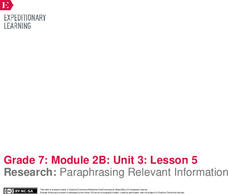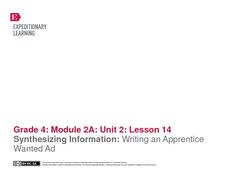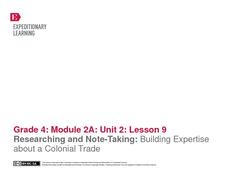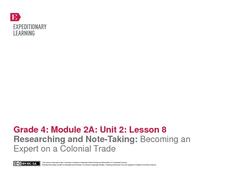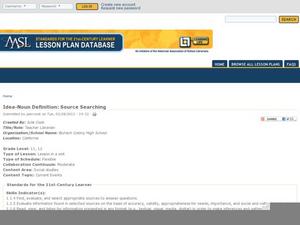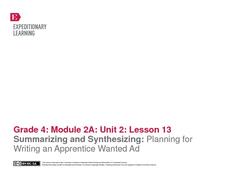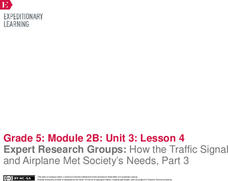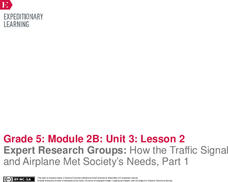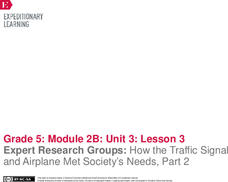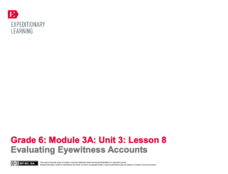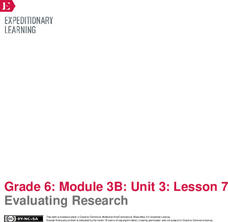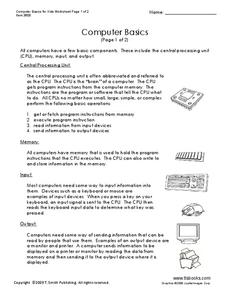EngageNY
Research: Paraphrasing Relevant Information
Young writers practice paraphrasing information from Truth in Advertising? They keep an eye out for examples of false advertising as they read, recording ideas and information in their researcher's notebook along the way.
EngageNY
Synthesizing Information: Writing an Apprentice Wanted Ad
Fourth graders view examples of help-wanted ads as they plan and create their own writing in the fourteenth instructional activity of this unit on colonial trade. The engagement of the class is captured when the teacher shares an actual...
EngageNY
Researching and Note-Taking: Building Expertise about a Colonial Trade
Building on the previous activity in this unit on colonial trade, the ninth activity has young experts continuing their research and writing summaries of the information they find. To begin, children participate in guided practice where...
EngageNY
Conducting Research: Analyzing Text from the Qikiqtani Inuit Association (QIA)
Scholars read excerpts from the Qikiqtani Inuit Association website as they begin researching their case studies on the Mary River Project. They read an article to build background knowledge and analyze key vocabulary words using the...
EngageNY
Researching about the Red Cross, Continued: Who Is the Red Cross and What Does This Multinational Organization Do?
Code red! Learners read an informational article about the Red Cross, discussing the gist of the text in small groups. On a three-column note catcher, pupils take notes to show how the Red Cross functions as a multinational aid...
EngageNY
Researching and Note-Taking: Becoming an Expert on a Colonial Trade
Fourth graders work in small groups to become experts on different colonial trades in the eighth instructional activity of this unit. Working toward the long-term goal of writing a piece of historical fiction, young scholars read...
EngageNY
Resource Materials and Gathering Information: Reading Another “Choice” Text from the Research Folder
Look it up. Scholars use a dictionary and thesaurus to verify the meaning of the research vocabulary words they defined in the previous activity. They then use sticky notes to write a synonym for each word. Finally, individuals choose a...
Curated OER
Idea-Noun Definition: Source Searching
A great idea for showing language arts pupils the universality of themes, even in the real world! Have class members choose an idea-noun (peace, justice, war, love, etc.) at the beginning of the year or semester. They complete weekly...
EngageNY
Summarizing and Synthesizing: Planning for Writing an Apprentice Wanted Ad
In instructional activity 13 of this unit on colonial trade, young researchers learn about apprentices as they prepare to write help-wanted ads for the specific trade they have been researching. To begin, the class listens closely as the...
EngageNY
Conducting Research: Asking and Answering our Questions about Rainforest Arthropods
Let's ask an expert. Scholars divide into groups to research and become experts on either ants or butterflies. Learners use task cards and text on their topic to complete a note catcher. At the end, they share their information with a...
EngageNY
Expert Research Groups: How the Traffic Signal and Airplane Met Society’s Needs, Part 3
Pupils work in expert research groups, reading an informational article about an invention and completing a note-catcher worksheet. Afterward, scholars work in triads to answer questions based on the text.
EngageNY
Introducing New Athletes to Research: Althea Gibson and Roberto Clemente
Let's take a walk! Scholars participate in a gallery walk to view images and text about athletes Althea Gibson and Roberto Clemente. After summarizing the information they've learned, pupils choose which athlete they are interested in...
EngageNY
Contrasting Authors’ Use of Evidence: Bottled Water
Apples to oranges, Dasani to Aquafina. Using a Venn diagram, scholars contrast two authors' use of evidence on the topic of bottled water. Additionally, they continue reading Charles Fishman's The Big Thirst and answering text-dependent...
EngageNY
Using Effective Search Terms: Researching Screen Time
The proof is in the reading. Scholars read an article, "Attached to Technology and Paying the Price," and answer text-dependent questions. Next, they complete a Venn diagram to contrast two authors' use of evidence on the topic of screen...
EngageNY
Using Effective Search Terms: Researching Water Management
Discover how to use search terms effectively! Scholars continue their exploration of Charles Fishman's The Big Thirst, engaging in a read aloud and then answering text-based questions. Next, pupils learn about using search terms and...
EngageNY
Expert Research Groups: How the Traffic Signal and Airplane Met Society’s Needs, Part 1
Where would society be without the TV? Working together, scholars complete an anchor chart about the invention of the television. Additionally, pupils complete vocabulary cards for key terms from the unit and organize them on a metal ring.
EngageNY
Expert Research Groups: How the Traffic Signal and Airplane Met Society’s Needs, Part 2
Ready, set, act! Using the fun resource, pupils patriciate in a vocabulary charades activity to practice key terms from the unit. Next, scholars work in expert research groups to read an article about the invention of the traffic signal...
EngageNY
Evaluating Eyewitness Accounts
That sounds like a plan! Scholars complete the Newspaper Article Planning graphic organizer to understand the process of writing a newspaper article. They also use what they learned about researching factual information and gathering...
EngageNY
Evaluating Research
Calling all archaeologists! Scholars dig through their research about overfishing, searching for the best information to include in their consumer guides. Next, pupils engage in a pair-share activity to discuss their findings with a...
EngageNY
Individual Research
Seventh graders get the option of choosing their own text from a selection to read and gather more information as part of their research. Learners discuss the difference in reading for research and reading for pleasure. They also begin...
T. Smith Publishing
Computer Basics for Kids Worksheet
This informational reading worksheet can be used in your literacy or computer class. Learners learn the basic components of computers then test their knowledge with multiple choice and fill-in-the-blank questions.
Curated OER
Popular Music and Music Videos
This resource is part of a three-activity unit that introduces your class to the concept of popular culture and the role that it plays in their lives. Here, learners examine the importance of the music industry and music videos in pop...
Curated OER
Planning A Vacation Online
If you could travel anywhere in the United States, where would you go? Use this question to interest your fourth, fifth, and sixth graders as they experiment with Mapquest or other direction-based resources. They choose where they'd like...
EngageNY
Analyzing the Features of a Newspaper Article
There's more to newspaper articles than meets the eye. Scholars learn the different features of a newspaper article, including headline, byline, subheadings, etc. Pupils circle the features in an article as the teacher discusses their...


